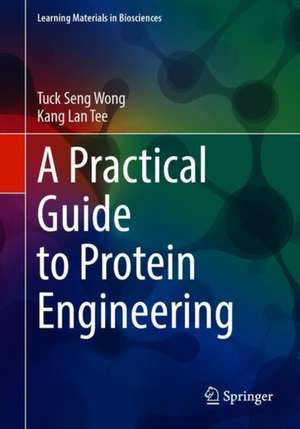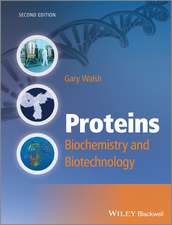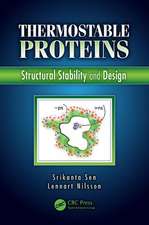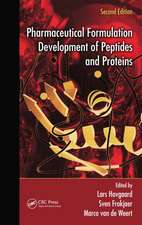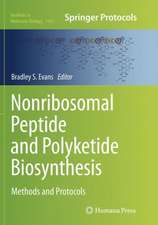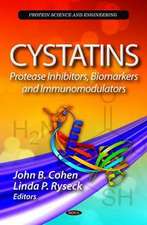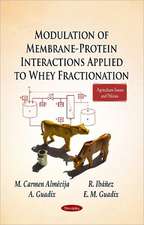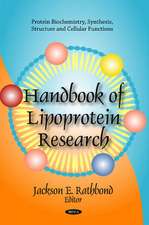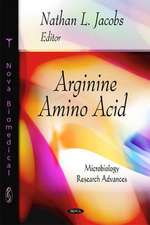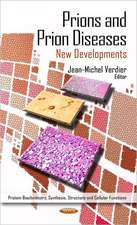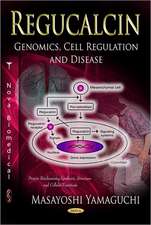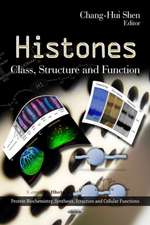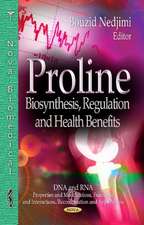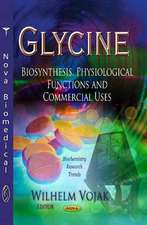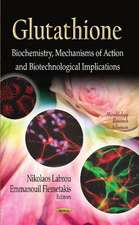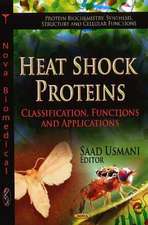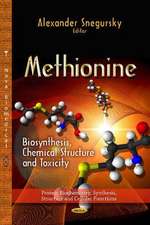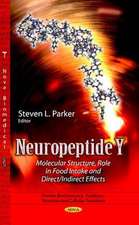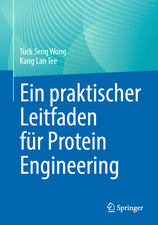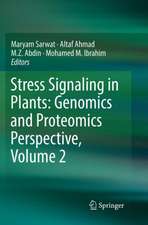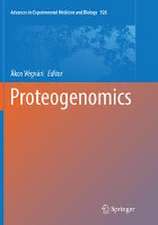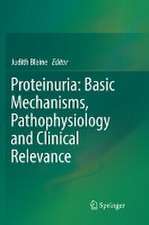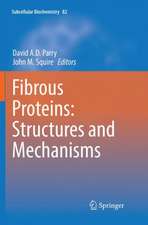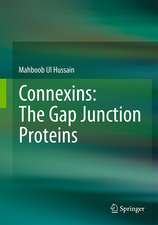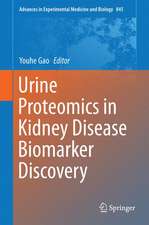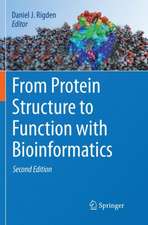A Practical Guide to Protein Engineering: Learning Materials in Biosciences
Autor Tuck Seng Wong, Kang Lan Teeen Limba Engleză Paperback – 30 oct 2020
This textbook introduces readers in an accessible and engaging way to the nuts and bolts of protein expression and engineering. Various case studies illustrate each step from the early sequence searches in online databases over plasmid design and molecular cloning techniques to protein purification and characterization. Furthermore, readers are provided with practical tips to successfully pursue a career as a protein engineer. With protein engineering being a fundamental technique in almost all molecular biology labs, the book targets advanced undergraduates and graduate students working in molecular biology, biotechnology and related scientific fields.
Din seria Learning Materials in Biosciences
- 17%
 Preț: 394.87 lei
Preț: 394.87 lei - 20%
 Preț: 506.68 lei
Preț: 506.68 lei - 5%
 Preț: 529.76 lei
Preț: 529.76 lei - 5%
 Preț: 338.39 lei
Preț: 338.39 lei - 5%
 Preț: 330.25 lei
Preț: 330.25 lei -
 Preț: 347.49 lei
Preț: 347.49 lei - 5%
 Preț: 561.91 lei
Preț: 561.91 lei - 17%
 Preț: 426.67 lei
Preț: 426.67 lei - 17%
 Preț: 457.76 lei
Preț: 457.76 lei - 5%
 Preț: 491.25 lei
Preț: 491.25 lei - 17%
 Preț: 490.61 lei
Preț: 490.61 lei -
 Preț: 358.43 lei
Preț: 358.43 lei - 17%
 Preț: 424.90 lei
Preț: 424.90 lei - 5%
 Preț: 414.83 lei
Preț: 414.83 lei - 17%
 Preț: 458.26 lei
Preț: 458.26 lei - 13%
 Preț: 383.66 lei
Preț: 383.66 lei - 17%
 Preț: 396.09 lei
Preț: 396.09 lei - 5%
 Preț: 797.65 lei
Preț: 797.65 lei - 20%
 Preț: 345.74 lei
Preț: 345.74 lei - 5%
 Preț: 797.65 lei
Preț: 797.65 lei - 17%
 Preț: 428.12 lei
Preț: 428.12 lei - 5%
 Preț: 671.48 lei
Preț: 671.48 lei - 19%
 Preț: 397.78 lei
Preț: 397.78 lei -
 Preț: 339.79 lei
Preț: 339.79 lei - 15%
 Preț: 527.97 lei
Preț: 527.97 lei - 19%
 Preț: 477.46 lei
Preț: 477.46 lei - 5%
 Preț: 583.96 lei
Preț: 583.96 lei - 19%
 Preț: 436.50 lei
Preț: 436.50 lei - 5%
 Preț: 527.90 lei
Preț: 527.90 lei - 15%
 Preț: 494.85 lei
Preț: 494.85 lei - 15%
 Preț: 466.45 lei
Preț: 466.45 lei - 15%
 Preț: 494.85 lei
Preț: 494.85 lei - 5%
 Preț: 524.97 lei
Preț: 524.97 lei - 15%
 Preț: 533.72 lei
Preț: 533.72 lei - 15%
 Preț: 528.99 lei
Preț: 528.99 lei -
 Preț: 353.65 lei
Preț: 353.65 lei - 5%
 Preț: 595.01 lei
Preț: 595.01 lei - 15%
 Preț: 527.48 lei
Preț: 527.48 lei
Preț: 457.86 lei
Preț vechi: 551.64 lei
-17% Nou
Puncte Express: 687
Preț estimativ în valută:
87.61€ • 91.80$ • 72.43£
87.61€ • 91.80$ • 72.43£
Carte disponibilă
Livrare economică 22 martie-05 aprilie
Livrare express 08-14 martie pentru 25.94 lei
Preluare comenzi: 021 569.72.76
Specificații
ISBN-13: 9783030568979
ISBN-10: 3030568970
Pagini: 202
Ilustrații: XV, 202 p. 91 illus., 68 illus. in color.
Dimensiuni: 168 x 240 x 17 mm
Greutate: 0.32 kg
Ediția:1st ed. 2020
Editura: Springer International Publishing
Colecția Springer
Seria Learning Materials in Biosciences
Locul publicării:Cham, Switzerland
ISBN-10: 3030568970
Pagini: 202
Ilustrații: XV, 202 p. 91 illus., 68 illus. in color.
Dimensiuni: 168 x 240 x 17 mm
Greutate: 0.32 kg
Ediția:1st ed. 2020
Editura: Springer International Publishing
Colecția Springer
Seria Learning Materials in Biosciences
Locul publicării:Cham, Switzerland
Cuprins
Literature Search.- Sequence Analysis.- Structural Analysis.- Protein Expression Hosts and Expression Plasmids.- Gene Cloning.- Protein Expression.- Assay.- Gene Mutagenesis.- High-Throughput Screening (HTS).- Protein Variants Analysis and Characterization.- Continuing from Protein Variants.- Employability.
Notă biografică
Dr. Tuck Seng Wong is a Senior Lecturer (Associate Professor) from the Department of Chemical & Biological Engineering at the University of Sheffield (UK). He is also a Visiting Professor at the National Center for Genetic Engineering and Biotechnology (BIOTEC) in Thailand. Dr. Wong leads a Biocatalysis & Synthetic Biology group in Sheffield, and his research focuses on sustainable biomanufacturing using engineered enzymes or microbes. His passion in engineering of biology is inspired by his research supervisors and mentors including Nobel Laureate Prof. Frances H. Arnold (Caltech), Prof. Ulrich Schwaneberg (Bremen), Prof. Sir Alan R. Fersht (Cambridge) and Prof. Alexander Steinbüchel (Münster). Dr. Wong obtained his BEng in Chemical Engineering (1st class honour) from the National University of Singapore, followed by an MSc and a PhD (special distinction, highest possible grade) in Biochemical Engineering from the Jacobs University Bremen in Germany. He is a recipient of multiple prestigious fellowships, including the RAEng|The Leverhulme Trust Senior Research Fellowship (2019), the Royal Academy of Engineering Industrial Fellowship (2016) and the MRC Career Development Fellowship (2007 – 2009). He was one of the 10 young academics appointed to the EPSRC Early Career Forum in Manufacturing Research in 2014 and a world finalist of the Synthetic Biology Leadership Excellence Accelerator Program (LEAP) in 2015. He has published over 40 papers, mostly in the areas of protein engineering and synthetic biology.
Dr. Kang Lan Tee is a Lecturer (Assistant Professor) from the Department of Chemical & Biological Engineering (CBE) at the University of Sheffield (UK). She has published over 20 papers in the field of protein engineering and synthetic biology since 2004. Dr. Tee is also the co-Founder of protein engineering start-up SeSaM-Biotech GmbH and a Global Challenges Research Fellow (2019 – 2021). Her research team applies protein engineering strategies to address global challenges in biomanufacturing and sustainability. She also develops and leads the biorefineries module in CBE
Dr. Kang Lan Tee is a Lecturer (Assistant Professor) from the Department of Chemical & Biological Engineering (CBE) at the University of Sheffield (UK). She has published over 20 papers in the field of protein engineering and synthetic biology since 2004. Dr. Tee is also the co-Founder of protein engineering start-up SeSaM-Biotech GmbH and a Global Challenges Research Fellow (2019 – 2021). Her research team applies protein engineering strategies to address global challenges in biomanufacturing and sustainability. She also develops and leads the biorefineries module in CBE
Textul de pe ultima copertă
This textbook introduces readers in an accessible and engaging way to the nuts and bolts of protein expression and engineering. Various case studies illustrate each step from the early sequence searches in online databases over plasmid design and molecular cloning techniques to protein purification and characterization. Furthermore, readers are provided with practical tips to successfully pursue a career as a protein engineer. With protein engineering being a fundamental technique in almost all molecular biology labs, the book targets advanced undergraduates and graduate students working in molecular biology, biotechnology and related scientific fields.
Caracteristici
Teaches theory and practice of protein engineering in a well-readable way Uses case studies to illustrate each step of the experiment Provides an overview on career prospects as a protein engineer
